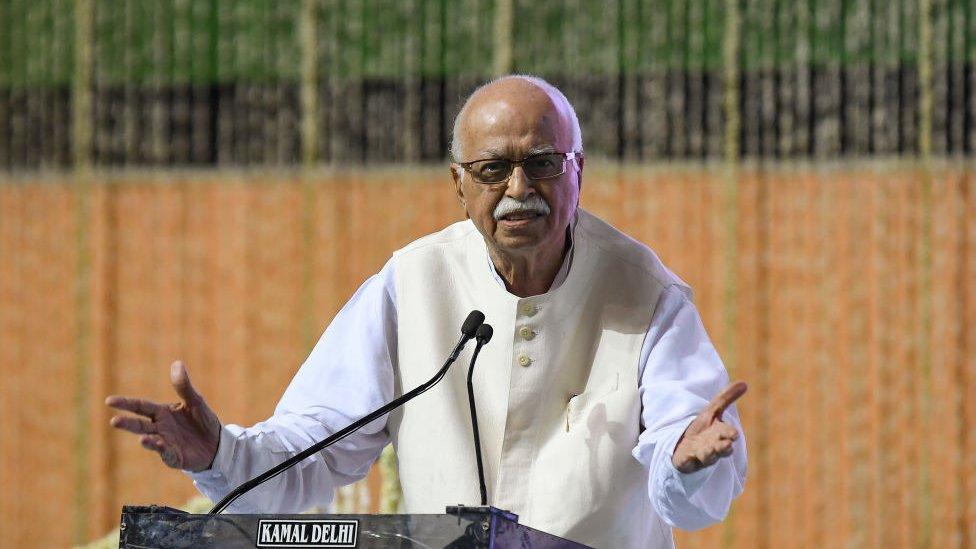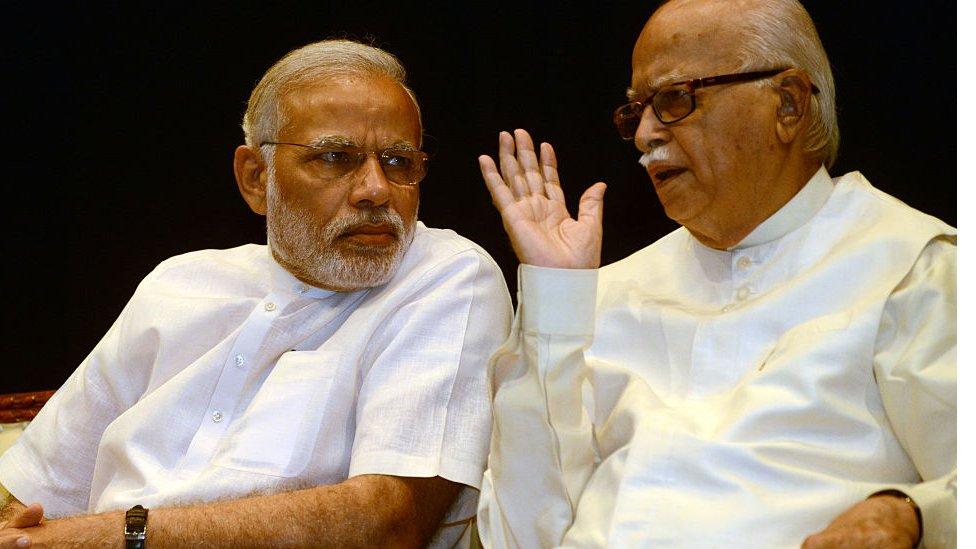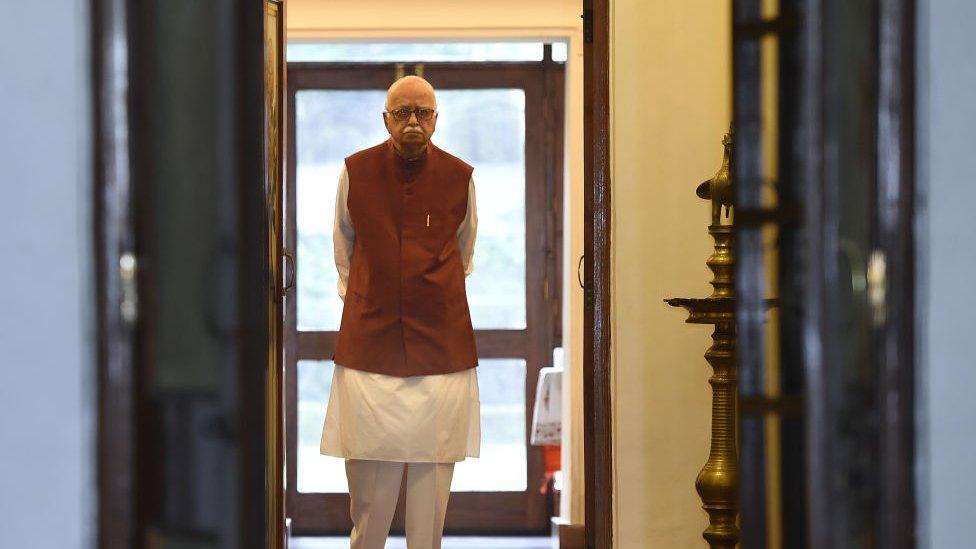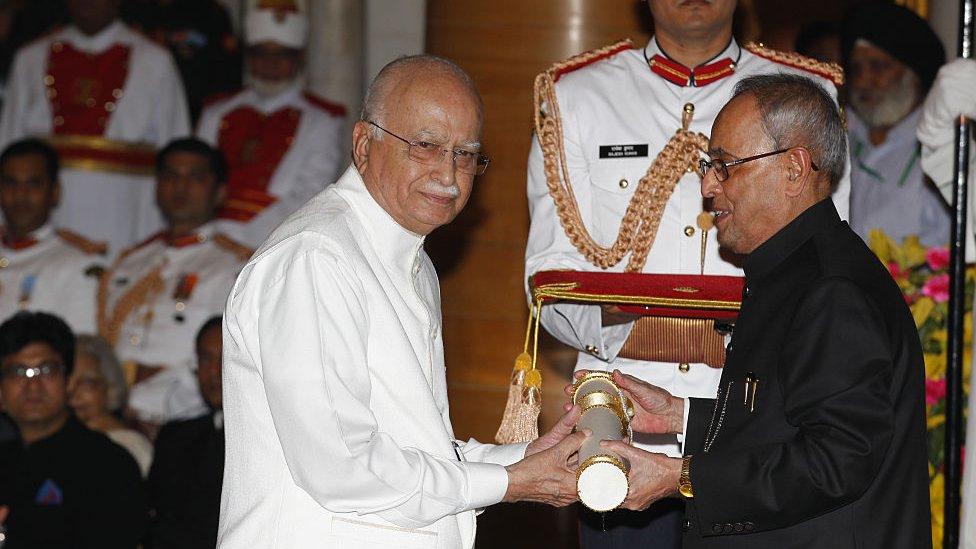LK Advani: The man who scripted the rise of India's BJP
- Published

Mr Advani is known for his formidable organising skills
Lal Krishna Advani is credited with scripting the rise of the Bharatiya Janata Party (BJP) as a major political force in India.
The 92-year-old used to be the BJP's poster boy before Prime Minister Narendra Modi came to prominence. Mr Advani spearheaded the decades-old movement to construct a temple in the flashpoint northern town of Ayodhya.
He was back in the headlines on 30 September 2020 when a court acquitted him of inciting Hindu mobs to destroy the 16th Century Babri mosque in the town in 1992. Hindus believe that it was built on the birthplace of Lord Ram.
What happened to the mosque, and subsequently to India, is a major part of Mr Advani's political legacy.
But analysts say he is now virtually irrelevant in the party he co-founded. He holds no important position in party or government, and has rarely made his opinions public in recent years.
Troubled transition
LK Advani's journey into the political wilderness coincided with the rise of Narendra Modi and the man who is now home minister, Amit Shah. Soon after Mr Modi led the BJP to power in 2014, Mr Advani and other senior party leaders were put in a group called the Guidance Council - which analysts say holds no real decision-making powers.
Mr Advani had helped take the BJP from two parliamentary seats in 1984 to form a government within 15 years, But many say he was upstaged by the young leaders he nurtured.

Mr Advani (right) is regarded as having promoted Mr Modi in the BJP
The veteran leader's announcement in 2013 that he was resigning from all party positions was an indication of this shift. Analysts say he was upset at Mr Modi's promotion to lead the party's election campaign ahead of the 2014 polls.
But his resignation still came as a shock and many leaders rushed to his house to try to pacify him. He eventually supported Mr Modi and even attended his swearing-in ceremony.
As Mr Modi's stock rose across the country in the following years, Mr Advani grew more silent. He did not contest the 2019 parliamentary elections, which saw Mr Modi return to power with a resounding victory.
Hawk who lost election
Mr Advani rose to be deputy PM under Atal Behari Vajpayee. After general election defeat in May 2004, he stepped up to lead his party.
His attempted image makeover, reaching out to young voters with his own website and blog and even popping into a gym on the campaign trail during the 2009 general election, didn't work. The party failed to defeat the Congress and Manmohan Singh returned to power.

Mr Advani has been largely quiet on political issues in recent years
Electoral success having eluded him, it is the campaign over Ayodhya for which LK Advani will go down in history.
In 1990, he travelled across India, whipping up support for a campaign to build a temple on the site of the Babri mosque. Its destruction led to some of the deadliest religious violence in India's history.
Mr Advani has fought ever since to clear his name after allegations emerged that he had incited the mobs.
And despite his acquittal, his critics will always accuse him of having exploited Hindu-Muslim tensions, damaging the secular credentials of India.
His supporters, however, say the campaign galvanised an entire generation and drew millions of supporters to the party which went on to help reshape India's economy and its image in the post-Cold War world.
Disciplinarian
Mr Advani was born in Karachi in what is now Pakistan and his family moved to India just before British India was partitioned in 1947.
He was a member of the Rashtriya Swayamsevak Sangh (RSS), the Hindu nationalist organisation from which the BJP draws its ideological roots.

Mr Advani was awarded Padma Vibhushan - the second highest civilian honour in 2015
Mr Advani had a reputation as an efficient and honest - if at times ruthless - administrator with considerable analytical skills.
He is well known as a cricket and Bollywood buff and an enthusiast for the writings of Alvin Toffler about the need to adapt to a changing world.
He once told the BBC that he keeps fit by eating frugally. Mr Advani also has a reputation for being a strict disciplinarian and a family man.
Pakistan visit controversy
It was as part of his attempt to reposition himself politically and cast off his hawk's clothing that he made a landmark six-day trip to Pakistan in June 2005, amid a thaw in relations.
By adopting a more moderate tone, Mr Advani would make himself more palatable to a broader electoral base, the theory went.
But his praise for Pakistan's founder Mohammed Ali Jinnah, and his description of him as secular, aroused anger and controversy in India.
He offered to step down as party president after he found himself isolated within the BJP and criticised by Hindu nationalist pressure groups that regard the founder of Pakistan as the architect of the partition of India along communal lines.
Some of the BJP's coalition allies were also unhappy. He weathered the storm although he failed to go on to win the prime minister's job.
History will remember LK Advani as a divisive figure who played a huge role in changing the face of India over a decades-long career.